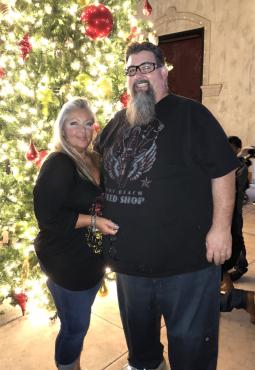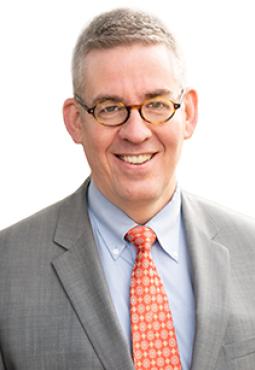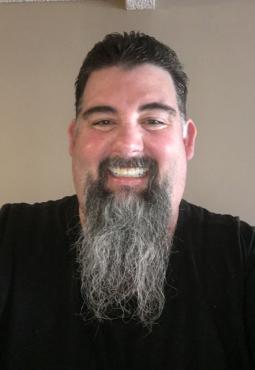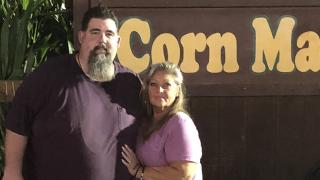Jeff Martin just wanted someone to take him seriously.
The 52-year-old logistics specialist from Ontario, California, had been seeing blood in his stool for several months. His local doctors were dismissive, blaming the problem on blood-thinning drugs Martin was taking for atrial fibrillation, a heart irregularity.
Martin suspected their attitude had more to do with the person they saw before them. Martin weighed close to 500 pounds.

He hadn’t always been morbidly obese. The weight gain began after his parents divorced and Martin, living with his mother, found himself playing the role of Mom’s “food buddy,” earning edible treats for good behavior, chores, whatever. “I was always rewarded with food,” he recalled.
He went out for sports, but was always “the biggest kid on the team.” He gave up athletics when walking home from the playing fields exhausted him. He concentrated on academics, winning a spot on the National Honor Roll, though by then he was so large “I couldn’t fit behind my desk.”
The weight led to health problems from diabetes to back trouble to torn cartilage in his knee to a catastrophic fall on a factory floor, as co-workers watched in horror.
Again and again, Martin experienced an uncomfortable truth: Like it or not, people, including doctors, treated him differently.
By 2021, Martin was at the age when experts recommend regular colonoscopy screenings to guard against colorectal cancer, but he’d never gone for one. “Cancer was never on my mind,” he said.
The bleeding changed his mind. Nevertheless, it still took six months before a doctor finally agreed to perform the procedure. In short order, Martin got the diagnosis: He had sigmoid colon cancer.
“The sigmoid is the last part of the bowel as it enters the rectum,” explained Andreas M. Kaiser, M.D., City of Hope’s chief of the Division of Colorectal Surgery. “It’s one of the most common locations for colon cancer and, when localized, it’s a pretty standard approach to resect it.”
As Martin would painfully discover, when you weigh 500 pounds, nothing is “standard.”
Refused to Do Treatment
His local doctors refused to subject Martin to any kind of surgery, even to extract and examine his lymph nodes — a critical step in determining what stage his cancer was. Without proper staging, one potential key treatment — chemotherapy — is essentially ruled out. Oncologists won’t risk administering such toxic drugs with incomplete information.
And no one wanted to perform the bowel resection to remove the cancer and save Martin’s life.
“I went to one surgeon,” recalled Martin, struggling to contain his emotion, “He took one step into the examination room, looked at me and said, ‘We have a problem.’ He went on to say that I was too big, and that the hospital didn’t have the tools to operate on me.”

Experts point out that surgery on a morbidly obese person may involve heightened risk to the heart, the lungs and other organs. Obtaining accurate images can be difficult; fat tends to blur the pictures. Plus, there’s the daunting challenge of navigating through so much heavy body tissue to reach the malignancy and excise it.
Martin’s wife Sheila, also in the exam room, demanded of the reluctant doctor: “What if it were your kid in this situation, what would you do?” The physician curtly replied, “I would never have let my kid be in that situation!”
It was not the only door being slammed in Martin’s face.
Sometime earlier, he had begun preparatory classes for stomach reduction surgery, a (some say) drastic step that can often help patients drop significant weight. He was almost ready when his cancer diagnosis abruptly blocked that path; no one would operate until he was cancer free and in remission for three years.
It was a maddening catch-22. No weight loss surgery with cancer. No cancer surgery until he lost weight.
Martin, now as infuriated as he was scared, sought a second opinion, realizing that “either my weight or my cancer was going to let me die.”
His doctors referred him to City of Hope.
And everything changed.
Finally, a Plan
“It was overwhelming,” recalled Martin of his first time visiting the Duarte, California, campus. “Everyone there, from the parking attendants to the janitors to the ambassadors, they were just different. I never had a bad interaction with anybody. Nobody treated me as ‘less than.’ There’s a special place in heaven for those folks.”
His first meeting with Kaiser reassured him — and the doctor’s kindness brought him to tears.
“He was very happy to hear that we would not upfront simply shut the door,” Kaiser said. “And when I told him we would not reject him, he cried.”
Perhaps that’s because the doctor told Martin one additional thing.
“He said to me, ‘You wouldn’t be the biggest person I’ve done surgery on,’” said Martin, blinking back tears at the memory.

Kaiser’s determination to go forward when other hospitals declined speaks not only to his skill but especially to the attitude at City of Hope.
“Where others stop, that’s where we get started,” he said. “Ultimately, if a patient has problems, but we have expertise, we should find a way to approach” the case.
It was a rapid approach. Kaiser ordered a new round of tests to verify the extent of the cancer. Then he mapped out a plan: one long, open procedure (it was deemed too complex for laparoscopic or robotic methods) in which plastic surgeon Wai-Yee Li, M.D., would first remove a substantial amount of fat from Martin’s abdomen to reduce stress on his organs and provide better access to the malignancy. Kaiser would then take over and resect the bowel.
Before surgery could take place, Martin needed pulmonary, cardiac and other “clearances” from his own physicians. A flood of red tape ensued. So, Kaiser and his staff got on the phone and made sure everything got done. “They were like a dog with a bone,” recalled Martin, impressed by the way his new champions fought for him. “They facilitated what was hard for me to get.”
Martin understood the risks, but he was at peace with his decision. “I had faith,” he said. “I felt like my book had already been written and that these people [at City of Hope] were put in my path for a reason. So, I was OK. I was ready to go.”
A Risky Surgery
In fact, though many things could have gone wrong, nothing did. There were no complications and Martin came through the surgery remarkably well. He recovered quickly and went home within a week. He was beginning to feel like himself again, but faced a new challenge: Cancer was detected in one of the lymph nodes that Kaiser had removed. That meant Martin’s cancer was Stage 3, and he would have to start chemotherapy.
“I lost it. I started crying,” Martin said. “And I got angry, thinking about all the delays I’d been put through [before City of Hope], all the time that was wasted before I was diagnosed.”

But on Feb. 3, 2023, he completed his chemotherapy, and subsequent tests indicate he is now cancer free.
“My experience,” said Kaiser, “is that patients are willing to take risks, if you give them hope. So, we put everything on the table, explain all the options and alternatives. If we think we can do some good, we don’t let that window of opportunity close.”
Martin is grateful.
“From now on,” he says, “If you say ‘cancer’ to me, I will say ‘City of Hope.’ They are lifesavers. They treat people better than you’ll get treated anywhere else. Without them my life would have been shortened extremely.
“That’s their gift, and it’s something I can never repay, but I’ll scream it from the tallest mountains!”
